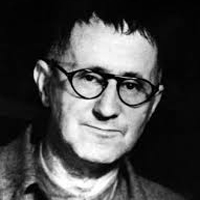Dramatic Irony in Brecht's Galileo
Dramatic irony implies to the speech and action of a character that is guided by partial or utter misunderstanding of the reality. The character is not consciously using irony to satirize someone. Irony is realized from conscious or unconscious speeches or actions. It happens to take place in the play when there is difference between appearance and reality.

Bertolt Brecht (1898-1956)
Virginia utters an ironic statement. Her Galileo father Galileo was an astronomer. She might tell her father to cast her horoscope because the much awaited marriage of her with Ludovico was going to be fixed. Instead of letting her father to cast her horoscope she said "I need another astronomer other than my father Galileo to cast my horoscope for my forthcoming marriage with Ludovico. This is one example of dramatic irony.
Another brand of dramatic irony can he observed in the behavior of Cardinal Barberini. Cardinal Barberini was himself a mathematician. He was well aware of the correctness of Galileo's theories. Because of this awareness he had scholarly respect and sympathy for Galileo. Despite intimacy and sympathy for Galileo, Cardinal Barberini revealed his dogmatic, superstitions and vindictive attitude to Galileo immediately after he became pope VIII in the chamber of Veticon. The higher position of power cardinal Barberini reached, the more unreasonable and illogical he appeared to be. A reasonable man lost his reason and became brutal when he assumed the higher level of political and theocratic power. A sympathetic man to Galileo became an exceedingly brutal man when he reacted the position of power. When Cardinal Barberini put on the robe of pope he began to reveal his corrupted and intoxicated nature. Out of his intoxication he became reckless and extremely regardless. To speak in a straightforward language, Cardinal Barberini, who has now become pope VIII, victimized Galileo, though he himself became victimized indirectly. In his endeavor to falsify Galileo he himself was falsified. In a move to denude Galileo Cardinal Barberini, himself, was denuded. This is a brilliant example of dramatic irony.
From the conversation of the little monk with Galileo, we come across a funny example of another sort of dramatic irony. The little monk appears to have been on the horn of the dilemma. He knows about the limitations of faith-oriented knowledge and Ptolemaic-Aristotelian-Christian world-view. He too asserts the superiority of reason-led scientific knowledge. But he becomes terribly frightened by the religious implications of the scientific theories. He tries to persuade Galileo to stop his scientific investigations. He clearly points out that Galileo's scientific findings generate a host of religious implications. In this way he makes Galileo precautions in his move to explore scientific findings. A man with the horns of a dilemma, the little monk makes an ironic move to put a free man like Galileo on the similar horns of a dilemma. This is ironically funny.
In scene twelve there is another kind of Irony. In the Garden of the Florentine Ambassador at Rome, many well-wishers, friends, disciples and daughter of Galileo have been looking forward to know how Galileo reacts to his being forcibly interrogated in the Inquisition. Their much-expected waiting ended in a humiliating disappointment. Andrea Sarti had expected that his master Galileo would never recant. But having heard that his master recanted, he felt painfully humiliated and disappointed. Andrea Sarti uttered the following statement, "Unhappy is the land that has no heroes". To this utterance of Andrea Sarti, Galileo responds "Unhappy is the land that needs a hero." This remark uttered by Galileo is ironical. Any sincere utterance of by Galileo is ironical. A quester of truth, free from the bondage of dogma and creed, must be given the freedom to live an ordinary life, to think ordinarily, and to behave ordinarily.
Apart from these instances of dramatic ironies there is one different kind of irony. Galileo knew that due to his un-preparation to face martyrdom, science was defeated. He also knew that his further effort in scientific research can't revive the defeated spirit of science. But he does not stop doing scientific research even in his old age. It sounds ironical.
Galileo Study Center
Introduction of Brecht's Galileo
Significance of Telescope in Brecht's Galileo
Brecht's Dramatic Technique in Galileo
Conflict between Faith and Doubt in Galileo
Elements of Experimental Modernism in Galileo
Marxist Standpoint of Brecht in Galileo
Spirit of Science and Galileo in Brecht's Galileo
 |
bachelorandmaster.com |